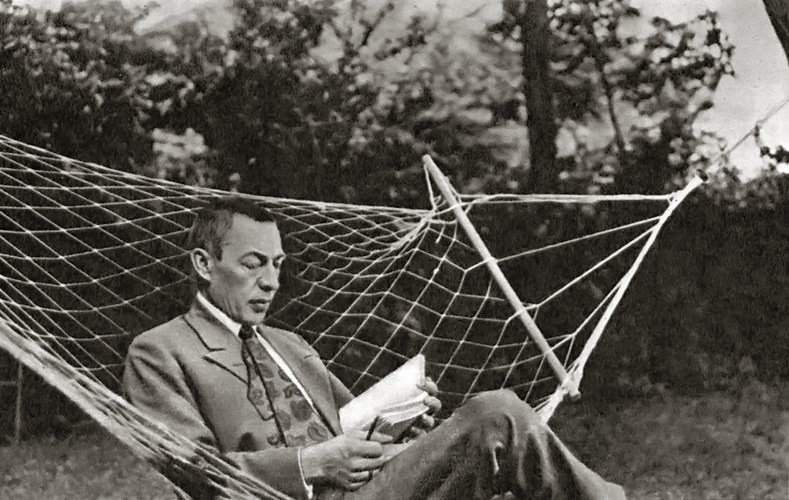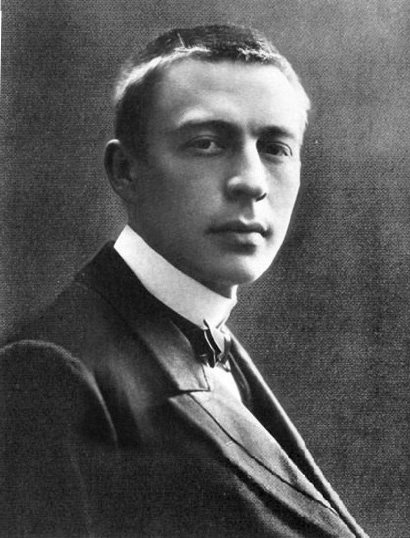Happy Birthday, Sergei Rachmaninov!
Sergei Rachmaninov hanging out on his dacha in Locust Point, New Jersey. 1923. Wikimedia Commons.
Happy Birthday!
175 years ago, on 1 April 1873, Russian composer and piano virtuoso Sergei Rachmaninov was born on an estate near Lake Ilmen, about 200 km from St. Petersburg. The Rachmaninovs were an old aristocratic family, and Sergei was the third out of six children. He started piano lessons at age four and his mother immediately recognized her son’s special musical talent: he could play melodies from memory without mistake. Sergei’s mother was the daughter of an army general and had brought five estates into the marriage. But Sergei’s father was financially incapable and had to sell one estate after the other. The last estate was auctioned off when Sergei was nine, and the family moved into a small flat in St. Petersburg.
Skipping School
But the family’s tragedy was Sergei’s luck: his father had intended a military career for his son, but a military career was expensive, and now out of reach. Instead of joining the Page Corps, a military academy preparing sons of the nobility for a military career, Sergei enrolled at the St. Petersburg Conservatory. But young Sergei did not enjoy his academic classes at the conservatory. He secretly skipped school and turned into an excellent ice-skater. Unfortunately, the school did not approve. Sergei was kicked out, and sent to Moscow, where he lived with his new piano teacher Nikolai Zverev while attending the Moscow Conservatory. Zverev turned the boy into one of the greatest piano virtuosos of the 20th century. Rachmaninov’s dexterity was unrivalled: he was soon playing in a category of his own.
Sergei Rachmaninov, 19 years old. Moscow Conservatory. 1892. Wikimedia Commons.
Budding Composer
Rachmaninov also started composing, much to Zverev’s dismay, who thought that composing was a waste of time for a talented pianist. Rachmaninov moved out of his teacher’s and into his uncle’s flat – and promptly fell in love with Vera, the youngest daughter of a neighbouring family. The girl’s mother was appalled and forbade Rachmaninov to write to her daughter. Instead, he wrote to Vera’s older sister, inserting musical messages to Vera in his letters. When he graduated from the conservatory, he won a gold medal for his one-act opera Aleko. He would make his mark in music not just as an extraordinary pianist, but also as a composer.
On the veranda at Ignatova, 1897. Rachmaninov with the three Skalon sisters. Glinka Museum Moscow. Wikimedia Commons.
Depression
But Rachmaninov’s path as a composer was anything but smooth. The premiere of his first symphony in 1897 was a resounding failure. The critics hated the piece, comparing it to the seven plagues of Egypt in the bible. Rumour has it that composer Alexander Glazunov, who conducted the premiere, had been sloppy with rehearsals, and drunk during the premiere. Rachmaninov fell into a deep depression and barely composed anything for three years. In 1900, he started hypnotherapy sessions. The therapy worked. Rachmaninov resumed composing and dedicated his first completed work (his iconic 2nd piano concerto) to his therapist. He also married his cousin Natalia Satina.
An International Star
Rachmaninov and his family left Russia for an extended period following the political upheaval following the 1905 revolution. This was the beginning of Rachmaninov’s career as one of the first international classical music stars: touring Europe and the US, he became a celebrated piano virtuoso. He earned well for his concerts and enjoyed living a luxurious lifestyle. He loved fast sports cars and technological gadgets. His guests would often get to admire the power of his vacuum cleaner, a new invention at the time.
The Tragedy of Exile
After the Russian Revolution of 1917, Rachmaninov went into exile, spending most of his time in Switzerland and the USA. But he would never really feel “at home” again. He never completely mastered the English language and missed Russia. He needed to be at home and near his own people to feel the inspiration to compose. Rachmaninov composed hardly anything of note during exile, focusing on his career as a concert pianist instead. He passed away in Beverly Hills in 1943. He had wanted to be buried in Russia – a wish that could never be fulfilled.
What is Music?
Rachmaninov composed in the Russian romantic tradition at a time when classical music was moving in a different direction. Excited about atonality, members of the emerging modern music establishment looked down on the melodies of the “late Romantic.” But there is a timelessness to Rachmaninov’s emotional melodies. As Rachmaninov once said: “What is music? How do you define it? Music is a calm moonlit night, the rustle of leaves in Summer. Music is the far-off peal of bells at dusk! Music comes straight from the heart and talks only to the heart: it is love! Music is the sister of poetry, and her mother is sorrow.”


